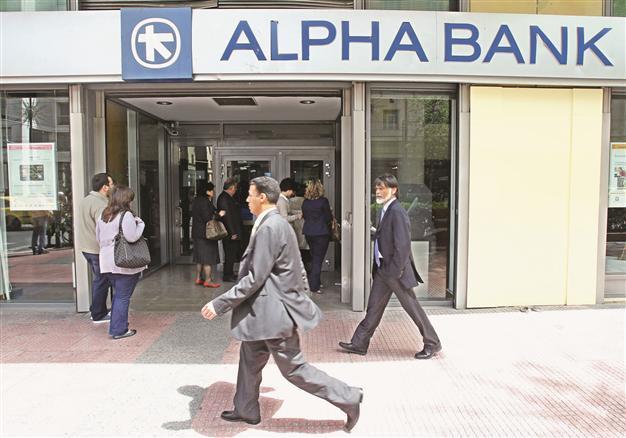Greeks withdrawing deposits
ISTANBUL - Anatolia News Agency

Pedestrians pass outside a bank branch in Athens in this file photo. Greeks are becoming increasingly nervous about their bank accounts as the May 6 elections failed to bring political stability to the crisis-hit country. AP photo
Greek bankers estimate that local depositors withdrew about 1 billion euros in the last 10 days from banks in Greece, according to daily Hürriyet, while the Greek president has said the figure is about 800 million euros.Greeks are worried that economic woes will worsen and Greece will have to return to the drachma, its national currency before joining the eurozone, as the country is slated for another general election on June 17.
Greeks pulled about 800 million euros out of the banking system between May 7 and 14, President Karolos Papoulias said on May 16.
“There is, of course, no panic, but there is fear that could develop into panic. He also said that the strength of banks is very weak at the moment,” Papoulias said, after speaking to Central Bank Governor George Provopoulos, describing what the bank governor told him.
Greek banks are relying heavily on the 18 billion euros of recapitalization loans they expect to receive this week as part of the second bailout package of 130 billion euros as deposits steadily drain out. As for the Greek Treasury, it has enough money to last until mid June, daily Hürriyet reported yesterday.
Total deposits held by domestic residents and companies stood at 165.36 billion euros in March, Greek central bank data show, according to a report by the Wall Street Journal.
Since the outbreak of the Greek debt crisis in 2009 depositors have withdrawn nearly 70 billion euros and transferred funds overseas. In the past two years, deposit outflows have generally averaged between 2 billion euros and 3 billion euros a month, while topping at 5 billion euros.
Banks loose ECB support
Greek banks borrowed 73 billion euros through the ECB’s lending operations in January, and an additional 54 billion euros via the ECB’s emergency-lending facility, according to Bank of Greece figures.
Highlighting the fragile state of Greece’s banking system, the ECB said on Wednesday it had stopped providing liquidity to some lenders because their capital was too depleted, according to Reuters. That meant the affected banks could no longer offer assets to the ECB as collateral for loans, and would have to seek costlier emergency financing from the Bank of Greece. It was not immediately clear which banks, or how many of them, were affected.
The country has had no elected government since an inconclusive election on May 6 in which parties opposed to the unpopular austerity measures that were part of the bailout did well, raising the chance that the rescue funds could be halted and push the country toward bankruptcy and out of the euro.
European leaders have said several times that if Greece fails to meet promises to them, lenders will pull the plug on financing.
















